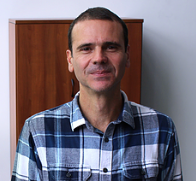
If you feel more stressed than you did before the pandemic, you’re not alone. Despite high rates of vaccination and our deeper familiarity with COVID-19, Canadians are still anxious.
A deep dive into mental health survey data by researchers at the University of Waterloo shows that almost a quarter of Canadians are still reporting anxiety and suggests that the mental health impact of the pandemic might still be observed for a few years to come.

Supported by a Mitacs grant, a national organization that connects agencies with academic researchers, the project aims to make even greater use of a MHRC survey that was sent out to between 3,000 and 4,000 Canadians every six to eight weeks since April 2020.
Overall survey data has revealed that anxiety levels have not changed significantly since December 2021, with around 23 per cent of Canadians indicating high anxiety and approximately 15 per cent indicating high depression.
“You might expect the stress would go down because we're used to this new reality, but it hasn’t,” says Betini, adding that economic concerns and the return to traditional workplaces may also be playing a part in the continued elevation. Not surprisingly, front line health-care sector workers experience the highest rates of mental health struggles, with 33 per cent reporting a diagnosis of anxiety.

For example, one question set delved into participants’ use of mental health services, revealing an increase from 11 to 22 per cent since the start of the pandemic. Yet another question reported that more than one in 10 Canadians felt they should be accessing mental health care, but are not, an insight with the potential for further exploration into why.
Sometimes requests to explore the effects on particular populations will come from partners such as Health Canada, and others will be based on the researchers’ own interests. As a student himself, one of Betini’s own curiosities was examining the effects on students. He’s set to release a paper on the anxieties felt by students from 16 to 24 years of age, and says he was surprised to find that it was not so much their student status but their age group that made younger adults more stressed. He’s currently studying the effects of the pandemic on mothers with young children and soon-to-be investigating levels of trust in the health-care system by different populations.
While Betini’s work was originally set to wrap up after a year, his contract has been extended and MHRC now has funding for three years. Betini says that he would like for his research to help inform public health decision making and that just having this data is a helpful record of Canadians’ experiences.
“My hope is for public health officials to understand what's happening and make decisions that help people.”